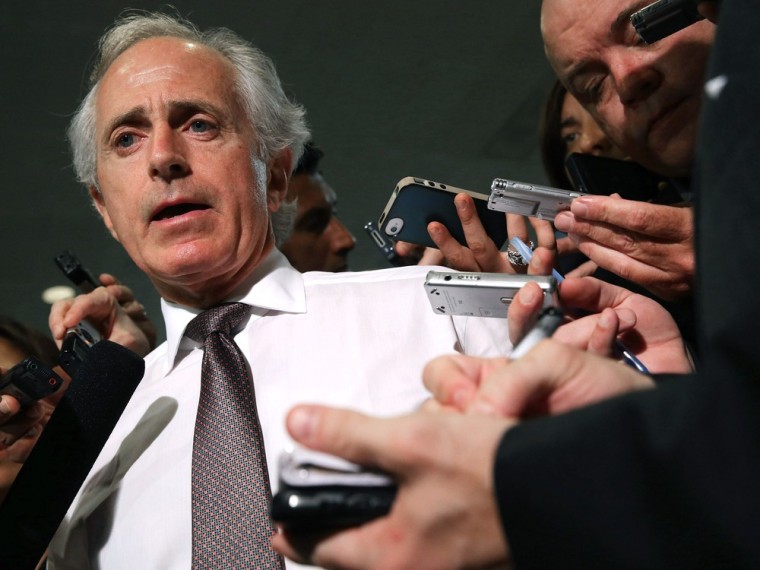The top senators on the Foreign Relations Committee are nearing an agreement on a new resolution authorizing the use of force in Syria, ranking member Sen. Bob Corker told reporters Tuesday at the Capitol.
Corker said he and Foreign Relations Committee Chairman Bob Menendez, D-N.J., met privately with President Barack Obama at the White House after a larger meeting with congressional leaders and key committee members.
"Based on the conversation we just had in the Oval Office, I think that we are in agreement with regard to what the authorization needs to address," Corker said Tuesday.
The meeting took place ahead of Tuesday’s committee hearing, where Secretary of State John Kerry, Defense Secretary Chuck Hagel and Chairman of the Joint Chiefs Martin Dempsey will make the case for intervention in front of the members of Congress they need to persuade.

"This hearing is very, very important toward building the case and getting the kind of support that we'll need in the Senate," Corker said.
Lawmakers who attended a classified briefing at the Capitol earlier in the day were mixed on whether they planned to support the president's plan to strike Syria. Sens. Angus King, I-Maine, Jeff Flake, R-Ariz., and Max Baucus, D-Mont., said that they were still making up their minds about a strike. Sen. Bob Casey, D-Pa., said he'll support the president, while Sen. Rand Paul, R-Ky., is a likely no.
"I probably won't vote for any resolution," he told reporters.
"As the intelligence bakes in, members hear from their constituents, members talk to one another, this will solidify. But we're not there yet," said Rep. Steve Israel, D-N.Y., the chairman of the Democratic Congressional Campaign Committee.
But several lawmakers said the president needs to do a better job of explaining the goals of such a mission to the American people.
"He needs to sell not only the leadership but also the rank-and-file members in both houses to get the votes. But even more importantly than that, he needs to sell the American people. My constituents I've talked to are deeply skeptical of the plan and actually don't understand what the strategy is," said Sen. John Cornyn, R-Texas, the no. 2 Republican in the Senate.
"He's got to go on national television," said Sen. John McCain, R-Ariz., who met with Obama on Monday. "I told him yesterday, I said, 'sit behind that desk, look at the camera and say, here's the pictures of these dead children. Here's the hundred thousand that have been massacred. Here's what's going on.
"These children didn't die because of wounds - look at them," McCain continued. "But most Americans don't know. They don't understand. They don't know what the strategy is. They don't know what the policy is."
McCain is one who says he could refuse to support a resolution that too limited the president's power to affect the situation on the ground in Syria. But McCain has also said it would be “catastrophic” for Congress to reject the president’s call to use force.
And that's the fine line Menendez, Corker and Senate leaders are trying to walk as they craft the new resolution -- narrowing the scope of the administration's authority in a way that many Democrats want without losing support from McCain and fellow hawkish Sen. Lindsey Graham, R-S.C.
"If one side is overwhelmingly happy, where massive uses of force can be used, we're going to lose a whole host of people, and if in fact it's so narrow that some of the goals can't be achieved, you're going to lose people too," Menendez, the Foreign Relations Chairman, said Tuesday morning.
There two big issues for lawmakers who want to limit action: An express prohibition on using ground troops and a limit on how long the intervention can last.
"There is a way to not have it so broad that you could contemplate troops on the ground, that you could contemplate an open ended period of time - which are two of the biggest things I've been hearing from members - but at the same time, permit the actions to be taken to be authorized in such a way that doesn't create that end of the spectrum but at the same time strikes the right balance," Menendez said.
Corker told reporters that the new resolution could be released as early as Tuesday evening or Wednesday morning. The panel would then likely hold a formal markup session to allow committee members to amend it. The goal, Corker said, is to let members still at home for the recess break to see the text before they return to vote on the authorization next week.